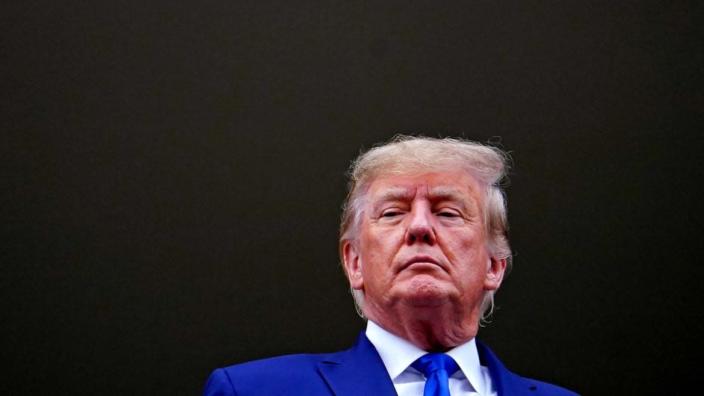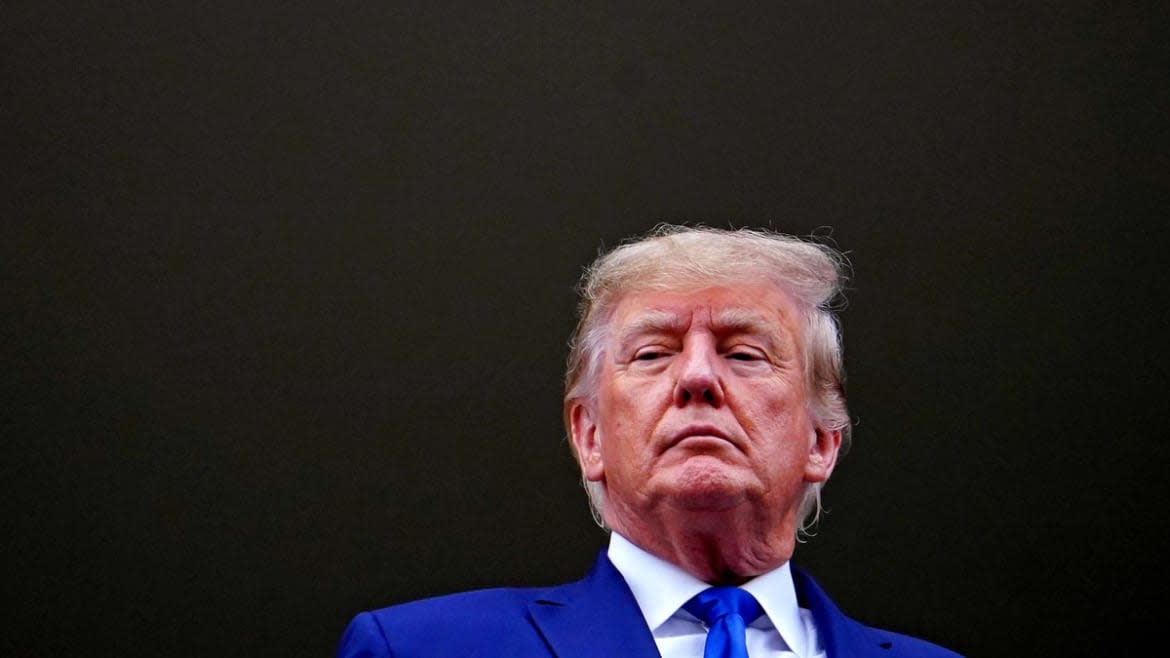
The Jan. 6 commission begins its much-anticipated national reckoning Thursday night by drawing attention to the brutality faced by Capitol police officers 18 months ago and delving into details about one of the gangs that led the violence on that dark day.
While it’s doubtful the hearings will live up to the sky-high expectations of those who believed the commission would expose open misconduct by some of the country’s top officials, the primetime hearings will yield one thing: evidence for many of the the lawsuits seek to actually make former President Donald Trump and other election deniers pay for the violence.
“What the committee cannot do is call people to account. But that’s where criminal charges and civil lawsuits come in,” said Edward G. Caspar, an attorney who represents injured and traumatized Capitol police officers who are suing Trump after the violent uprising.
The real tragedy of January 6 is that it’s still not over
That inability to hold Trump accountable with this special panel may sound surprising given the assurance that committee leaders — Rep. Bennie Thompson (D-MS) and Rep. Liz Cheney (R-WY) – to discuss how Trump put forward “a corrupt plan to impede the counting of electoral college ballots and a conspiracy to impede the transfer of power.”
But that doesn’t mean there won’t be repercussions from the work of the House’s Jan. 6 committee. After all, the committee undertook what researcher (and former Republican representative from Virginia) Denver Riggleman called “the largest data effort in the history of congressional investigations.”
Still, one of the major challenges facing the panel’s investigation — with its controversial lawsuits, secret interviews and promises to uncover the truth — is that it ultimately lacks the power to punish those responsible for the attack. last year at the Capitol.
So far, legal scholars and progressive activists have directed their exasperated calls to action at the Justice Department. But the real action could come from lawsuits like those brought by Conrad Smith and seven fellow Capitol police officers in August against Trump, his campaign, Stop the Steal campaigners like Ali Alexander and Roger Stone, and enforcers like the Proud. Boys and the Oath Keepers Militia.
“The commission plays a vital role for America here,” Caspar said. “When you think of the three ways to seek accountability for those responsible for the attack — congressional hearings, criminal charges, civil lawsuits — they’re like a three-legged crutch. The committee can shine a very bright light on the evidence and present it to the public. The others cannot.”
The committee has had enough.
According to the panel, it interviewed more than 1,000 witnesses and collected at least 140,000 documents obtained through subpoenas and delivered under oath. Lawyers working on cases against Trump are already considering how to get that evidence — in some cases videos or transcripts of interviews — into a form admissible in court for their cases. Fortunately for those attorneys, the witnesses who spoke to the commission were already under oath when they testified.
McCarthy and Scalise say they won’t watch January 6 hearing
DC Attorney General Karl Racine — whose office in December charged the Proud Boys and Oath Keepers, as well as individual members of each militant group — has told The Daily Beast that he will closely monitor the hearings to see what evidence emerges that would be helpful in his case.
In fact, the commission’s first hearing, beginning Thursday at 8 p.m. EDT, is expected to address the Proud Boys’ role in the coordinated attack on the Capitol. The commission will hear two witnesses: Nick Quested, a documentary filmmaker who became embedded with the Proud Boys about Jan. 6, and Caroline Edwards, a Capitol police officer who suffered a traumatic brain injury that day.
The witnesses and the frenzy surrounding the first public hearing should make for somewhat immersive television — at least as immersive as congressional hearings can be. Even the choice of venue for the event has an element of TV drama; the committee hosts the hearing in the rarely used Cannon Caucus room, ostensibly to accommodate more press, but also to make the proceedings a little more official, with the room’s Corinthian columns and ornate chandeliers.
But the evidence revealed by the commission will likely be much more pedestrian. No bombshells are expected on Thursday evening. And yet, prosecutors and attorneys representing clients in civil cases may not need bombshells. Instead, they just need enough legal fodder to put certain people in the orbit of the twice-indicted former president — like Donald Trump Jr. and Rep. Mo Brooks (R-AL) – drag back to the court seat.
For example, in March, U.S. District Judge Amit P. Mehta dismissed Brooks as a defendant in the insurgency lawsuit filed by his congressional colleague, Representative Eric Swalwell (D-CA).
One of the attorneys on Swalwell’s legal team, Phil Andonian, thinks new evidence could convince the judge there’s a strong enough case that the Republican congressman bears some responsibility for the damage at the Capitol.
6 Jan. Summons committee 5 GOP congress members who refused to cooperate
It was already known that Brooks, a Trump loyalist who made various disproven claims about voter fraud, was wearing a bulletproof vest on the morning of January 6 when he told angry protesters near the White House that their ancestors “sacrificed their blood… and sometimes their lives.”
Brooks then asked the protesters, “Are you willing to do the same? Are you willing to do the same to fight for America?”
The Jan. 6 committee received thousands of text messages from Trump White House chief of staff Mark Meadows and others, including messages to Brooks that could further implicate the Republican congressman.
“This is going to be a good roadmap to explore when we get there. I’m definitely interested in many of the bit players we’ve identified,” Andonian told The Daily Beast. [that] Mo Brooks, Donald Trump Jr. and Rudy Giuliani were more involved than we could claim based on the public information we had at the time of filing the lawsuit.”
“We all know there was coordination and there were people within the campaign who were part of the rally and talking,” Andonian continued. “That’s only going to get stronger as this information makes its way out.”
Andonian expects his team may have to resubmit the lawsuit instead of just amending it. But the end result would still be what they were looking for: responsibility.
Until then, even those who strongly support the commission are aware of potential pitfalls.
Norm Eisen, a lawyer and senior fellow at the Brookings Institution who recently wrote a report on the commission’s role in saving the Republic, said this week that the commission has done all the incredibly difficult work to lay the groundwork for to show that for the first time in the country’s history, Trump and his associates have knowingly committed crimes by attempting to interrupt the peaceful transfer of power. But he acknowledged that hearings may still fail in some Americans.
Trump’s attorney John Eastman has ordered batch of emails and documents to be handed over to the Jan. 6 committee
“If it’s not twofold, that’s a risk. But they have brought in one of the most conservative members of the GOP caucus, Liz Cheney, as vice chair, an equal in managing this. Bipartisanship is a risk, but they’ve covered that,” he said. “The second risk is having nothing new to say.”
Doug Jones, the former senator and federal prosecutor from Alabama, said the commission must be especially careful in its out-of-gate coverage not to tarnish its findings with the perception that it is purely politically driven.
“What the committee has to be very careful about is if they forget they’re fact-finding,” Jones said. “They must not give the American public the impression that this is an attack on Donald Trump. They are looking for facts. The facts will speak for themselves. They’re going to connect the dots.”
Those facts are still coming in.
Late Tuesday night, US District Judge David O. Carter in California ordered John Eastman to hand over potentially damning documents to the commission. Eastman is the disgraced attorney who closely advised Trump on the ploy to stay in power by pressuring then Vice President Mike Pence not to certify electoral college results, and his emails — which the judge ruled they likely contained evidence of an actual crime – were ordered to be surrendered to the commission at 5 p.m. Wednesday.
Those emails, if made public by the commission, will only serve to fuel lawsuits against Trump’s inner circle. And even if they aren’t, lawyers suing Trump for monetary damages will still fight to get their hands on them — and expose them.
“Our business will continue and we will be able to hold these people accountable in a way that is public, transparent and will inform the American public,” Caspar said.
Read more at The Daily Beast.
Get the Daily Beast’s biggest scoops and scandals straight to your inbox. Sign up now.
Stay informed and get unlimited access to Daily Beast’s unparalleled reporting. Subscribe now.

